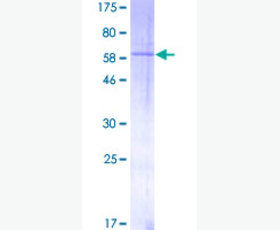Recombinant Mouse Interleukin-13/IL-13
| Product name: | Recombinant Mouse Interleukin-13/IL-13 |
| Source: | E.coli |
| Purity: | Greater than 95% as determined by reducing SDS-PAGE. |
| Buffer Formulation: | Lyophilized from a 0.2 μm filtered solution of PBS, pH 7.4. |
| Applications: | Applications:SDS-PAGE; WB; ELISA; IP. |
| Storage: | Avoid repeated freeze/thaw cycles. Store at 2-8 oC for one month. Aliquot and store at -80 oC for 12 months. |
| UOM: | 100ug/50ug/200ug/1mg/1g |
| Source | E. coli |
| Description | Recombinant Mouse Interleukin-13 is produced by our E.coli expression system and the target gene encoding Ser26-Phe131 is expressed. |
| Names | Interleukin-13, IL-13, T-Cell Activation Protein P600, Il13, Il-13 |
| Accession # | P20109 |
| Formulation | Lyophilized from a 0.2 μm filtered solution of PBS, pH 7.4. |
| Shipping |
The product is shipped at ambient temperature. |
| Reconstitution |
Always centrifuge tubes before opening. Do not mix by vortex or pipetting. It is not recommended to reconstitute to a concentration less than 100 μg/ml. Dissolve the lyophilized protein in ddH2O. Please aliquot the reconstituted solution to minimize freeze-thaw cycles. |
| Storage |
Lyophilized protein should be stored at < -20°C, though stable at room temperature for 3 weeks. Reconstituted protein solution can be stored at 4-7°C for 2-7 days. Aliquots of reconstituted samples are stable at < -20°C for 3 months. |
| Purity |
Greater than 95% as determined by reducing SDS-PAGE. |
| Endotoxin | Less than 0.1 ng/µg (1 IEU/µg) as determined by LAL test. |
| Amino Acid Sequence |
SVSLPLTLKELIEELSNITQDQTPLCNGSMVWSVDLAAGGFCVALDSLTNISNCNAIYRTQRILH GLCNRKAPTTVSSLPDTKIEVAHFITKLLSYTKQLFRHGPF
|
| Background | Mouse interleukin 13 (mIL-13) is a pleiotropic cytokine produced by activated Th2 cells. IL-13 induces B cell proliferation and immunoglobin production. It contains a four helical bundle with two internal disulfide bonds. Mouse IL13 shares 58% sequence identity with human protein and exhibits cross-species activity. IL13 signals via receptor IL13R (type2, IL4R) and activates STAT-6. IL13 initially binds IL-13Rα1 with low affinity and triggers association of IL4Rα, generating a high affinity heterodimeric receptor IL13R and eliciting downstream signals. IL13 also binds IL-13Rα2 with high affinity, which plays a role in a negative feedback system of IL13 signaling. IL13 is an important mediator of allergic inflammation and disease. |














